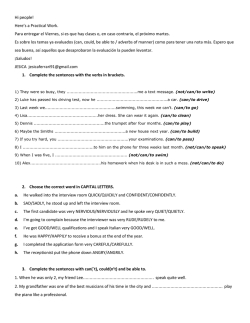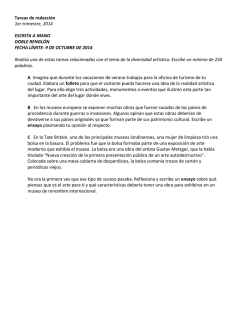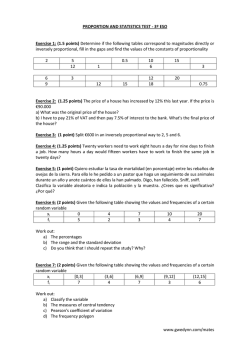
abstracts en 12 - Estudios Nietzsche
Resúmenes - Abstracts NIETZSCHE, EL LENGUAJE Y LA VERDAD: ALGUNAS PRECISIONES ACTUALES Nietzsche, Language and Truth: Some Present Remarks Jaime Aspiunza Universidad del País Vasco Resumen: Se suele decir que para Nietzsche la verdad no existe, con lo que se le hace pasar por patrón de esa especie de relativismo absoluto tan extendida hoy por la geografía de nuestras instituciones de enseñanza. Lo que aquí pretendo mostrar y demostrar es que eso es falso: Nietzsche critica y desmonta la concepción tradicional de la verdad, la idea de que alcanzamos con nuestro saber la realidad tal cual es, pero lo hace precisamente para caracterizar mejor qué es lo que propiamente hacemos cuando creemos apropiarnos de la verdad. Y eso que hacemos es la verdad verdaderamente humana. Palabras clave: realidad – verdad – hacer verdad – errar Abstract: It is usually said that there is no truth for Nietzsche, thus turning the German philosopher into sponsor of that sort of absolute relativism so widespread all over the geography of our educational institutions. What I try here to show and to prove is the falsity of such affirmation: Nietzsche criticizes, and dissolves, the traditional conception of truth, the idea that we —human beings— with the help of knowledge reach reality as it is. But he does so in order to depict better what we actually do when we think we are getting hold of true reality. And what we do is the truly human truth. Keywords: Reality – Truth – Truth-making – Erring EL SENORIO DE LA INTERPRETACION The Domain of Interpretation Sixto Castro Universidad de Valladolid Resumen: En este artículo reviso la idea de interpretación artística y la de obra de arte a la luz de las ideas de Nietzsche, y estas a la luz de tesis ontológicas, epistemológicas y estéticas contemporáneas. Analizo el descrédito del gusto en el arte contemporáneo en términos de resentimiento y culpa, siguiendo el análisis nietzscheano de La genealogía de la moral. Finalmente, subrayo la importancia de la belleza en los escritos nietzscheanos sobre arte como un recordatorio para el arte del futuro. Palabras clave: interpretacion – belleza – arte Abstract: In this paper, I review the ideas of artistic interpretation and of work of art in the light of Nietzsche’s ideas, and these in the light of some contemporary ontological, epistemological and aesthetic thesis. I analyze the discredit of taste in contemporary art in terms of resentment and guilt, following the Nietzschean analysis in The Genealogy of Morals. Finally I stress the importance of beauty in Nietzsche’s writings on art as a reminder for future art. Keywords: Interpretation – Beauty – Art EL MEJORAMIENTO DEL HOMBRE DESDE LA PERSPECTIVA NIETZSCHEANA The Human Enhancement from a Nietzschean Perspective Jesús Conill-Sancho Universidad de Valencia Resumen: Este articulo muestra la concepción nietzscheana del mejoramiento humano desde la perspectiva de la “Gran Política”, que revela una conexión con la idea de la eugenesia de Francis Galton, pero que implica una critica del concepto darwinista de la selección natural. Palabras clave: mejoramiento humano – Gran Política – eugenesia Abstract: This article shows Nietzsche’s conception of human enhancement from the perspective of “Great Politics” that reveals a connection with Francis Galton’s idea of eugenics, but implicates the criticism of the Darwinist concept of natural selection. Key words: Human enhancement – Great Politics – Eugenics SOBRE LOS CONCEPTOS Y LOS SIGNOS Nietzsche and Schopenhauer: On concepts and signs João Constâncio Universidad Lisboa Nueva Resumen: El objetivo de este articulo es indicar muy sucintamente que mediante la comprensión de las semejanzas y diferencias de Nietzsche respecto a los puntos de vista de Schopenhauer sobre los conceptos y los signos, se puede ver claramente la forma en que trata de superar algunos de los enigmas epistemológicos y ontológicos mas importantes de la modernidad; es decir, por que su filosofía, en muchos aspectos, puede ser vista ya como “contemporánea” o “actual”. El artículo presenta primero seis tesis de Schopenhauer sobre los conceptos y los signos, después seis tesis de Nietzsche que pueden parecer idénticas a las de Schopenhauer, pero que acaban siendo radicalmente diferentes. Mi tesis principal es que la concepción nietzscheana de las palabras y de los conceptos en términos de “signos” le debe mucho a Schopenhauer, y sin embargo, representa, en definitiva, un cambio radical del punto de vista de Schopenhauer y de toda la filosofía moderna. Palabras clave: concepto – signo – Schopenhauer – palabra Abstract: The aim of this paper is to show that by interpreting the similarities and differences between Nietzsche and Schopenhauer’s views on concepts and signs one can clearly see how Nietzsche attempts to overcome some of the most fundamental problems of epistemology and ontology raised in modernity — that is to say, why his philosophy is, in many respects, already “contemporaneous”. I start by presenting six of Schopenhauer’s main theses on concepts and signs and then six parallel theses put forward by Nietzsche. The latter may seem to be identical to the former, but in the end they prove to be radically different. My main point is that Nietzsche’s conception of words and concepts in terms of “signs” owes a great deal to Schopenhauer — and yet it represents a radical shift of perspective in relation to Nietzsche’s “master” and indeed in relation to the whole of modern philosophy. Keywords: Concept – Sign – Schopenhauer – Word LAS CAMPANAS DE GENOVA Bells of Genoa Paolo D’ I o r i o CNRS/ENS - Paris Resumen: Este texto explora los diferentes aspectos que conforman aquella experiencia intelectual que sobrevino a Nietzsche al escuchar el sonido de las campanas de Genova. En un primer momento, considerara los tres niveles semánticos de esta iluminación: biográfico, literario y filosófico. En un segundo momento, atenderá al desarrollo y adiciones de sentido de esta epifanía a través de la continua aparición en sus obras. Así pues, analizara los ecos semánticos de estas imágenes, así como las referencias intertextuales e intratextuales de las mismas. Palabras clave: eterno retorno – felicidad – cosas humanas Abstract: This paper explores the different aspects which made the intellectual experience that Nietzsche had when he heard the bells of Genoa. At first we consider the three semantic levels of this illumination: biographical, literary and philosophical. Then we explore the development and the additional meanings of this epiphany through the continued appearance in his works. Thus, we analyze the semantic echoes of these images, as well as references in and outside the text. Keywords: Eternal return – Happiness – Human things LA FUNCION DE LA METAFORA AL ABORDAR LAS CUESTIONES POLITICAS DE NIETZSCHE The Role of Metaphor in Nietzsche’s Approach to Political Issues Ivo Da Silva Junior Universidad Federal de Sao Paulo (UNIFESP) – Brasil Resumen: Mediante un análisis del capitulo “Pueblos y patrias” (§§ 240-256) de Más allá del bien y del mal, pretendo poner de manifiesto la manera en que Nietzsche lleva a termino su critica al nacionalismo como algo opuesto a la unidad europea, asumiendo como referencia la música alemana, especialmente la wagneriana, la cual, en este caso, contiene una cosmovisión basada en un ideal de formación (Bildung) prácticamente inexistente en la Alemania contemporánea del filosofo. De este modo pretendo enfatizar el hecho de que la política no puede ser tomada como una metáfora para describir “estados del alma”, sino que debe ser entendida en su dimensión real. Palabras clave: metáfora – nacionalismo – música – unidad de Europa Abstract: By analyzing the chapter “Peoples and Fatherlands” (§§ 240-256) in Beyond Good and Evil, we intend to point out the way by which Nietzsche accomplishes his critique to nationalism, as opposed to European unity, assuming as a reference German music, particularly the Wagnerian one, which, in this case, embodies a worldview based on an ideal of formation (Bildung) practically inexistent in the philosopher’s contemporary Germany. In this way we aim to emphasize the fact that politics cannot be taken as a metaphor to describe “states of soul”, but rather that it should be understood in its effective dimension. Keywords: Metaphor – Nationalism – Music – European unity “NACER POSTUMO” INACTUALIDAD, DISTANCIA Y ALT ERIDAD: LA “LEGIBILIDAD” DEL TEXTO NIETZSCHEANO “Posthumous Born”, Distance and Otherness: The “Legibility” of the Nietzschean Text Céline Denat Universidad de Reims, Francia Resumen: El término “póstumo”, usado frecuentemente por Nietzsche en sus escritos, ha sido atribuido como cualidad a su obra, debido a ese carácter inédito de la misma que impedía a sus contemporáneos el poder comprenderla. Este texto analizara con detenimiento dicho termino precisando, en primer lugar, como solo los hombres son póstumos, como solo ellos pueden tener un nacimiento póstumo; en segundo lugar, intentara aclarar por que Nietzsche no espera nada de sus lectores actuales por esa distancia que toma en sus escritos, por esa buscada incomprensión. De este modo, se expondrá como, cuando Nietzsche se refiere a su nacer póstumo, esta aludiendo a esa dimensión futura o inactual de su pensamiento. Palabras clave: póstumo – distancia – comprensión – autoridad Abstract: The term “posthumous”, which was frequently used by Nietzsche in his writings, has been attributed as a quality to his work, because its unprecedented nature prevented his contemporaries from understanding it. This paper discusses in detail the term specifying, first, that, as only men are posthumous, only they can have a posthumous birth; second, trying to clarify why Nietzsche did not expect anything of their current readers because of the distance he took in his writings, for the reason that he sought being misunderstood. Thus, we will show that, when Nietzsche referred to his posthumous birth, he alluded to the future or outdate dimension of his thought. Keywords: Posthumous – Distance – Understanding – Authority NIETZSCHE: .POLITICO O APOLITICO? Nietzsche: .Political or Apolitical? Carlo Gentili Universidad de Bolonia Resumen: Aunque en Nietzsche no hay una doctrina política en sentido estricto, su pensamiento tiene sin duda una dimensión política. Desde la segunda Consideración intempestiva sobre la historia, Nietzsche se muestra interesado en tomar distancia frente a la situación de su tiempo. Además, en el mismo concepto de “voluntad de poder”, sociedad, ética, mundo físico y político están estrechamente conectados. El concepto de “gran política” tiene un papel central, aunque tenga primariamente una connotación moral. En general, podemos decir que el sentido político de la filosofía de Nietzsche deriva siempre de sus ideas morales. Considera que su destino personal se corresponde con el destino de Europa. En sus últimas obras trabaja con el concepto de “aristocrático”, que tiene que ser entendido como una aristocracia del espíritu, en vez de social o política. Palabras clave: gran política – voluntad de poder – aristocracia – moral Abstract: Although there is no proper political doctrine in Nietzsche, his thought certainly has a political dimension. Since the II Untimely Consideration on history Nietzsche appears to be taking a stance towards the situation of his time. Afterwards, in the very same concept of “will to power” society, ethics, physical world and political world are strictly connected. The concept of great politics has a central role, even if it has a primarily moral connotation. In general, one could say that the political sense of Nietzsche’s philosophy always derives from his moral ideas. He considers his personal destiny corresponding to Europe’s destiny. In his late works he deals with the concept of “aristocratic”, which has to be understood as an aristocracy of the spirit rather than a social or political classification. Keywords: Great Politics – Will to Power – Aristocratic – Moral LECCIONES DE PSICOLOGIA: NOTAS SOBRE LA LECTURA NIETZSCHEANA DE HUMILLADOS Y OFENDIDOS DE DOSTOIEVSKI1 Psychology lessons: notes on the Nietzschean reading of Dostoyevski’s The Insulted and Injured Joan B. Llinares Universitat de Valencia Resumen: Este texto, primera parte de un extenso estudio sobre la lectura nietzscheana de Humillados y ofendidos de F. Dostoievski, arranca con una reflexión sobre la actualidad del análisis de las relaciones entre ambos escritores como un reto que sigue abierto en la Nietzsche-Forschung. Desde los documentos que testimonian dicha lectura y sus efectos (“mit dem grossten Respekt vor dem Kunstler Dostoiewsky”), se evidencia que hay que clarificar la concepción del artista que aquí se manifiesta. Las cartas de Nietzsche demuestran por otra parte que el filosofo valoro al escritor ruso sobre todo en cuanto psicólogo, segundo tema a explicitar. Los textos de E. M. de la Vogue sobre Dostoievski, de muy probable lectura por parte de Nietzsche, destacan tres aspectos que afianzan nuestro análisis: el arte trágico del novelista, su peculiar talante filosófico y los rasgos de Humiliés et offensés que convierten este libro en un antecesor de El idiota y, en consecuencia, en una de las fuentes de El Anticristo. Palabras clave: arte – artista – psicología – arte trágico – anticristo Abstract: This text, part of an extensive study on the Nietzschean reading of The Insulted and Injured by Dostoevsky, begins with a reflection on the currency of the analysis of the relations between both authors, as a challenge that remains open in the ‘Nietzsche-Forschung’. From the documents we testify that reading and its effects (“mit dem grossten Respekt vor dem Kunstler Dostoiewsky”) there is evidence to clarify the artist’s conception shown here. Nietzsche’s letters show, moreover, that the philosopher praised the Russian writer especially as psychologist, and this is the second issue we want to explain. The texts on Dostoevsky by E. M. Vogue, most likely read by Nietzsche, highlight three aspects which consolidate our analysis: the tragic art of the novelist, the peculiar philosophical mood traits of Humiliés et offensés, that make this book a predecessor of The Idiot and, consequently, a source of The Antichrist. Keywords: Artist – Psychology – Tragic Art DISTANCIA Y COMBATE: LA (IN)ACTUALIDAD DE NIETZSCHE Distance and combat: Nietzsche’s (Un)timeliness Scarlett Mar ton Universidad de Sao Paolo Resumen: Con este trabajo pretendemos explorar los diferentes sentidos que Nietzsche atribuyo al termino unzeitgemäss en sus textos. En un primer momento, queremos mostrar que Nietzsche no se limita a resaltar el carácter inactual de su pensamiento, sino que además quiere dar a conocer la tarea que se propone. A continuación, queremos mostrar que, en ciertos pasajes, al servirse del término, el filosofo no se restringe a sublimar el carácter póstumo de sus escritos, sino que insiste en su búsqueda de un lector ideal. Palabras clave: extemporaneo – actual – cultura filistea – lector ideal Abstract: In this paper we explore the different meanings attributed to the term unzeitgemäss in Nietzsche’s texts. At first, we want to show that Nietzsche wasn’t restricted to emphasizing the outdate of his thought, but also wanted to publicize his task. Then, we show that in certain passages, to make use of that term, the philosopher is not limited to sublimating the posthumous character of his writing, but insists on his search for an ideal reader. Keywords: Extemporaneous – Current – Philistine Culture – Ideal Reader SABER DE LAS PULSIONES. .SERIA APROPIADO HABLAR DE UNA EPISTEMOLOGIA NIETZSCHEANA?1 Knowing Drives. Would it be appropriate to talk about a Nietzschean Epistemology? Mariano Rodríguez González Universidad Complutense de Madrid Resumen: La cuestión de la verdad, y los niveles que en ella distingue, ocupan el centro de la teoría nietzscheana del conocimiento. Partiendo de una interpretación de Heidegger muy importante, se explora en este trabajo la tan peculiar mismidad de conocimiento y arte que se plasmaría en el entendimiento de la verdad como justicia. La teoría nietzscheana del conocimiento se aplica entonces, justificándose a si misma con esta tarea, a mostrarnos esa justicia como objetividad pero sobre todo como aprobación de lo real. Y ello siempre en el marco de una concepción del conocimiento como relación bélica de las pulsiones entre si. Palabras clave: verdad – justicia – objetividad – realidad Abstract: The truth subject, and the truth levels that it distinguishes, would be the core of Nietzsche’s Theory of Knowledge. Departing from a quite important Heideggerian interpretation, this paper explores that most peculiar sameness of knowledge and art which would mean to understand truth as justice. So that Nietzsche’s Theory of Knowledge will devote its efforts to let us see that justice taken as objectivity but in the first place as reality approval. These aims will justify by themselves Nietzschean reflection on knowledge, always understood as a fighting-and-(provisional) peace relation among drives. Key words: Truth – Justice – Objectivity – Reality NIETZSCHE Y LA IMAGEN .EL MUNDO VERDADERO SE HA CONVERTIDO EN UNA FABULA? Nietzsche and the Image. Has the real world become in a fable? Federico Vercellone Universidad de Turin Resumen: En este texto el concepto que tiene Nietzsche de la imagen es presentado tal y como evoluciono con el desarrollo de su filosofía. En sus primeros escritos, sobre todo en El nacimiento de la tragedia, lo que se pone de relieve es la imagen que se concibe como un símbolo artístico, como una expresión de la naturaleza y no como una representación del mundo. Si tenemos en cuenta el desarrollo del pensamiento de Nietzsche, podemos ver que en el último periodo tenemos una concepción de la imagen que depende de la idea de perspectiva, con un tipo de imagen que se concibe como una representación. La imagen como una representación ha perdido toda relación positiva con el mundo y es un factor importante en la “voluntad de poder”. La imagen coincide ahora con el “fin del arte” hegeliano. Palabras clave: imagen – perspectiva – voluntad de poder Abstract: In this text Nietzsche’s concept of image is presented as it evolved with the development of his philosophy. In his early writings, particularly in The Birth of the Tragedy, what comes out is the image which is conceived as an artistic symbol, as an expression of nature and not as a representation of the world. If we consider the development of Nietzsche’s thought, we can see that in the last period we have instead a conception of the image that depends on the idea of perspective, with a kind of image which is conceived as a representation. Image as a representation has lost every positive relationship to the world and is an important factor in the “will to power”. The image now coincides with the Hegelian “end of art”. Keywords: Image – Perspective – Will to Power ¿QUE SIGNIFICA PENSAR CONTRA SU TIEMPO? INACTUALIDAD Y FILOSOFIA DEL FUTURO EN NIETZSCHE What does it mean to think against his time? Untimeliness and Philosophy of the Future in Nietzsche Patrick Wotling Universidad de Reims/Cirlep EA 4299 Resumen: El objetivo de este trabajo es investigar la dimensión específica del hombre intempestivo, entre las numerosas diferentes versiones del filósofo (retratado también como espíritu libre, legislador, filósofo del futuro, discípulo de Dionisio...). Propone la hipótesis de que Nietzsche recupera esta figura, tras la desaparición de una década, porque muestra ser particularmente apta para describir la tarea principal del filosofo, esto es, el combate contra el nihilismo, sustituyendo por los valores que acrecientan la vida los valores ascéticos que han dominado en Europa desde Platón. Palabras clave: intempestivo – nihilismo – espíritu libre Abstract: The purpose of this paper is to investigate the specific dimension of the untimely man, among the numerous different versions of the philosopher (also portrayed as a free spirit, as a legislator, as a philosopher of the future, as a disciple of Dionysus…). It suggests that Nietzsche takes up again this figure, after a disappearance which spans over ten years, because it proves particularly fit to describe the philosopher’s main task, namely struggling against nihilism by substituting lifeenhancing values to the ascetic ones which have reigned over Europe since Plato. Keywords: Untimely – Nihilism – Free Spirit
© Copyright 2026



